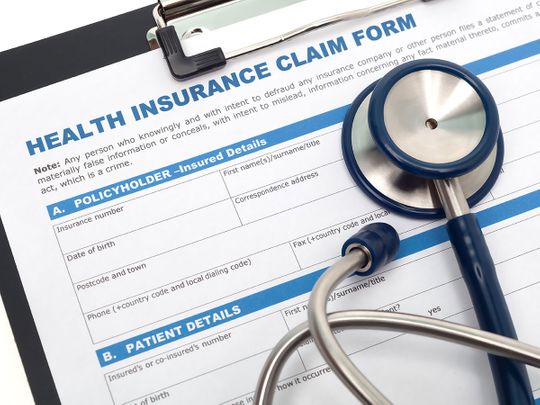
Dubai: The cost to insurers covering your medical insurance claims has been increasing every year, as evidenced by data published by the Central Bank of UAE (CBUAE). But for plans aside from those paid by your employer, will you spend more when routinely paying your premiums?
Under the mandatory health insurance laws of Abu Dhabi and Dubai, employers of foreign workers are required to provide private health insurance policies to cover employees’ healthcare costs, which is why total health insurance premiums generated remained static each year, the data further indicated.
“Rising insurance premiums do not impact employees in the UAE as employers contain the costs by reducing benefit levels for employees to achieve premiums at no greater level than the previous year,” wrote UAE-based Pamela Barbaglia, who has worked with insurers for over two decades.
“With employer funded health insurance plans, you do not want to see your benefits reduced, be that in your annual pharmacy benefit limit, your coverage limits or a restriction on the healthcare providers you access. You also don’t want to see any rise in the share of costs that you have to pay.”
So the key is to avoid – or at least limit to a greater degree – medical debt that can be deemed avoidable, reiterate UAE-based debt advisors.
However, not every medical expense turns into debt, and the bills themselves aren’t always the sole problem. In fact, multiple global surveys reveal that more than 1 in 7 medical bankruptcies is due to a child’s illness.
What medical debt is ‘avoidable’?
“It’s a fact that healthcare remedies are often unavoidable and even those with health insurance can land in medical debt as people do not plan to fall ill or hurt themselves. But not all healthcare-related costs are unavoidable,” said Abu Dhabi-based independent debt consultant Rajesh Markara.
“Unlike other forms of debt, ‘avoidable’ medical debt often results stems from people trying to convert it to unpayable levels of high-interest credit card debt. This debt often snowballs as people who get sick or have to care for a sick loved one to see their incomes drop because of time off work.”
Although medical debt is more concentrated among certain groups – people with low incomes, the uninsured, people unable to work due to their health – it affects people and households across the financial spectrum, agreed debt advisors. But that’s not all.
“While most of us rely on health insurance to subsidise medical costs, as mentioned earlier, the cost of coverage can rise over time too,” added Barbaglia. “Nevertheless, lack of insurance is still the main culprit behind the growing medical debt problem.”
How to avoid ‘avoidable’ medical bills?
• List out-of-pocket costs
Get the most insurance coverage you can afford — even when you're healthy. “Make sure you know what the deductibles will be, and call the insurer and ask someone to walk you through all the potential out-of-pocket costs,” Barbaglia said.
“Keep in mind that you cannot make changes to your policy except during certain windows of time, such as open enrolment or after a major life event.”
• Check specifics covered
After your doctors map out your treatment plan, check whether all the healthcare providers you need to see are part of your insurance network and whether any part of the treatment needs to be pre-authorised.
“Ask lots of questions of your insurance provider, doctor's office, or hospital, especially for planned procedures,” added Barbaglia.
• Get a cost estimate
If you're uninsured, ask for a cost estimate in advance. Most healthcare regulators worldwide require providers to give uninsured patients estimates of what planned care will cost.
“Keep an eye on costs as they come up and never assume that just because insurance covers one part of your treatment, it goes for everything else. Scrutinising your care can help you avoid costs,” cautioned Markara.
• Check for double billing
Go through each item on your bill. Even if you've already been discharged and gotten behind on payments, it is worth checking to make sure you weren't overcharged.
"It's not infrequent for something to be double billed. People also mistakenly think medical costs are fixed and non-negotiable. If you know you cannot pay the bill, negotiate with the hospital administration or billing department," advised Barbaglia.
Bottom line?
Managing medical debt can seem like a monumental challenge, especially if the expenses are unplanned, and sizeable even with help from your insurance. “Managing your medical debt is possible – even while also juggling a full line-up of ordinary expenses,” noted Markara.
“Unpaid medical debt can lead to collections and damage to your credit. There are ways to minimise debt, pay it off and avoid negative impacts, but you'll need a strategy and a systematic approach to get the best outcome.”
Gather up all of your bills and insurance explanation of benefits (EOB) forms and review them for duplicate billing, unauthorised charges and errors. Make sure your insurance company has paid for all covered expenses and that your medical provider has accounted for their payments.
“If your medical debt bills are going to make it impossible for you to cover your other expenses—including your mortgage, auto loan and credit card debt – you may put your financial health and credit at risk,” Markara added. “So ensure your debt payoff plan is sustainable as rising medical costs, insurance-related or otherwise, are most often beyond your control.”






_resources1_16a4a1613d8_small.jpg)


